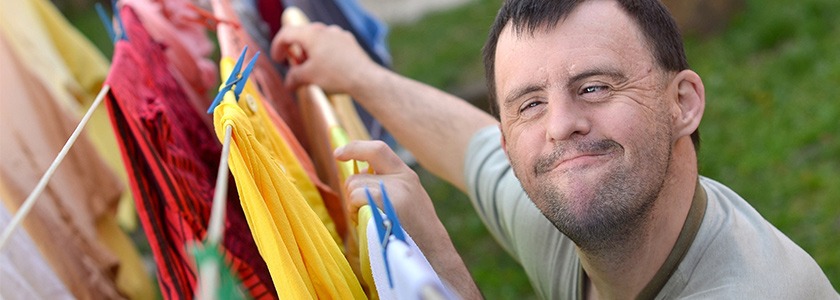Personal care and hygiene are important elements for socialisation, self-respect and independence.
As a caregiver, providing a person with Down syndrome the right foundation in personal care – whether they are a child, teenager or adult – can help them grow independence and take pride in their appearance.
Grooming & Hygiene Tips
It’s important to establish a routine for grooming, so that people with Down syndrome learn how important a personal care regimen is for independence.
Approaching each morning or evening in the same manner will establish habits which will stand them in good stead. For example, maintaining the same order of brushing teeth, bathing, applying deodorant and then combing hair.
Dependent on the individual, some people with Down syndrome may not know how long to bathe for. A good tip is to try putting a timer in the bathroom so that it regulates bathing time. Find the right timer and it can make bath time fun. You can also use music. Find two songs that they love – when they’ve both played through it’s time to get out.
Teenage girls with Down syndrome have the extra challenge of menstruation. Educate as much as possible about proper hygiene and techniques at this time. You should also talk to your daughter’s school clinic about providing extra support during this time of the month.

Dental Care Tips
According to dental site “Our Dental Care”, children with Down syndrome often have both baby and permanent teeth coming in at a later time, referred to as ‘delayed eruption’.
There’s also a cluster of common dental problems that are seen in patients with Down syndrome, such as crowding and periodontal disease. Although these may be down to other genetic factors, patients with Down syndrome may have trouble communicating the problem, which means they can go unchecked and worsen.
Firstly, it’s important to find the right dentist and schedule regular checkups. They need to be patient and understanding, with skills in communication. There are dentists who specialise in this area, such as The Special Needs Dentistry Practice.
Practicing proper oral hygiene at home is the foundation of good dental care. Teaching a child with Down syndrome how to brush properly will stand them in good stead. Approach mouthwash and flossing on a case-by-case basis.
By establishing a regular routine which covers the important elements of personal care, you can ensure that a child, teenager or adult with Down syndrome has the essential tools they need.
The National Disability Insurance Scheme (NDIS) provides funding for disability supports to people with Down syndrome, which includes assistance with personal care.
Zest Care is NDIS ready and has a dedicated team experienced in providing support with hygiene and care to people with disabilities. Find out more today.
Resources:
https://www.emergencydentistsusa.com/down-syndrome-and-dental-care/
Https://www.friendshipcircle.org/blog/2012/06/14/when-your-special-needs-daughter-gets-her-period/








